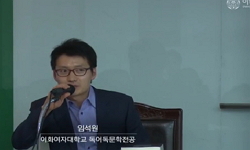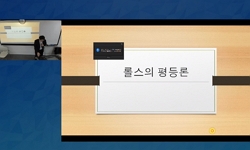석주명에 대한 긍정적인 평가를 살펴보면, 우리나라에서 지역 연구라는 개념이 제대로 서지 못했던 상황에서 통합적 학문으로서의 지역학을 열었다는 관점과 “우리 것과 우리 사람을 대수...
http://chineseinput.net/에서 pinyin(병음)방식으로 중국어를 변환할 수 있습니다.
변환된 중국어를 복사하여 사용하시면 됩니다.
- 中文 을 입력하시려면 zhongwen을 입력하시고 space를누르시면됩니다.
- 北京 을 입력하시려면 beijing을 입력하시고 space를 누르시면 됩니다.

석주명의 제주도 자료에 나타난 제주문화 = Culture of Jeju Shown in the Jeju Island Materials of Joomyoung Seok : Centering on the Critical Review of the Recognition about the Nature and Humanity Environment Shown in 『Jeju Island Essay Collection』
한글로보기https://www.riss.kr/link?id=A101748584
- 저자
- 발행기관
- 학술지명
- 권호사항
-
발행연도
2011
-
작성언어
-
-
주제어
제주학 ; 제주문화 ; 석주명 ; 타자 ; 국학 ; 他者 ; 國學 ; Jeju studies ; Culture of Jeju ; Joomyoung Seok ; The others ; Korean studies
-
KDC
300
-
등재정보
KCI등재
-
자료형태
학술저널
- 발행기관 URL
-
수록면
93-114(22쪽)
-
KCI 피인용횟수
0
-
비고
학회 요청에 의해 무료로 제공
- 제공처
-
0
상세조회 -
0
다운로드
부가정보
국문 초록 (Abstract)
석주명에 대한 긍정적인 평가를 살펴보면, 우리나라에서 지역 연구라는 개념이 제대로 서지 못했던 상황에서 통합적 학문으로서의 지역학을 열었다는 관점과 “우리 것과 우리 사람을 대수롭지 않게 여기고 하찮게 취급하는 풍토” 때문에 “이 위대한 조선적 생물학자”가 제대로 조명 받지 못했다는 관점이 드러난다. 여기에는 ‘우리의 것은 소중하다’라는 공통된 시각이 전제되어 있다.
그런데 이런 평가와 반성이 필요 이상으로 강조되면 오히려 그 전제에 대한 의문이 든다. 특히 석주명의 연구처럼 국학과 생물학, 지역성과 보편성, 물적 조건과 문화 심리적 조건 등의 요소가 대립되면서 긴장관계를 유지하는 경우는 석주명 자신은 물론, 그를 연구하고 평가하는 연구자들조차도 사실 이상의 당위를 강조하는 데서 빚어지는 혼란을 겪을 수밖에 없다.
위와 같은 전제에서 출발하면, 석주명 사후에 간행된 『제주도수필』을 통해서 몇 가지 발상의 전환을 시도해볼 수 있다. 우선 석주명의 시각을 제주도민이 아닌 타자의 시각으로 제한함으로써, ‘조선적 생물학’이라는 전제를 되짚어 볼 수 있다. 그리고 풍토(風土), 곧 물적 조건과 문화 심리적 조건의 상호관계를 다룬 그의 논의가 오늘날 로컬리톨로지로서의 제주학 담론에 어떤 영향을 끼칠 수 있는지를 비판적으로 검토해 볼 수 있다.
다국어 초록 (Multilingual Abstract)
If you examine the positive evaluations about Joomyoung Seok, two viewpoints are revealed. One viewpoint is the one that he opened regional studies as an integrated study in the situation where the concept of study on regions could not be established ...
If you examine the positive evaluations about Joomyoung Seok, two viewpoints are revealed. One viewpoint is the one that he opened regional studies as an integrated study in the situation where the concept of study on regions could not be established properly. The other view point is that nevertheless “this great Joseon(朝鮮) biologist” failed to get the spotlight properly because of "the climate in which people shrug Korean things and Korean people off and treat them like dirt". The single common view that penetrates these two viewpoints is that 'ours are precious'. In addition, in this common view and viewpoint, the praise that Joomyoung Seok is a genius scholar who tried convergence and integration or consilience of natural science and humanities before the 1950s comes to follow.
There is no other thing that makes our hearts flutter as much as the evaluation our scholar was ahead of the times does. In addition, there is no other thing that makes us shameful as much as the reflection that the evaluation was not made properly does. But, if these evaluation and reflection are emphasized beyond the necessity, rather a doubt about the prerequisite comes to be raised. In particular, in a case such as the case of studies of Joomyoung Seok in which the elements including study of culture and heritage of the country and biology, regionality and universality, material conditions and cultural and psychological conditions and so
on maintain the strained relations being opposed to each other, not only the person directly involved but also the researchers who study and evaluate him or her come to undergo a confusion created from the emphasis on the appropriateness which is more than the fact.
If you start the prerequisite like this, you can try some changes of conception in a series of process to arrange the culture of Jeju shown in the ‘Jeju Island Essays’, which is the fourth volume that was published after he passed away among the 6 volumes of the Jeju Island Series of Joomyoung Seok. First, you can look back
on the prerequisite of ‘Joseon biology’ that limited the viewpoint of Joomyoung Seok as a viewpoint of not a Jeju resident but ‘The others(他者)’ and for which even Seok himself could not help revealing “a cynical attitude” to some extent. In addition, through this series of process, you will be able to critically consider
what impact his discussion about the climate to which we cannot help placing some distance in our times, that is, what relations the material conditions and the cultural and psychological conditions have mutually, has on the discussion on Jeju studies as localitology today.
목차 (Table of Contents)
- Ⅰ. 들어가는 말
- Ⅱ. 석주명의 제주도 자료 구조 분석
- Ⅲ. 석주명의 제주도 자연 환경 인식
- Ⅳ. 석주명의 제주도 인문 환경 인식
- Ⅴ. 타자에 의한 제주도 문화 인식의 가능성과 한계
- Ⅰ. 들어가는 말
- Ⅱ. 석주명의 제주도 자료 구조 분석
- Ⅲ. 석주명의 제주도 자연 환경 인식
- Ⅳ. 석주명의 제주도 인문 환경 인식
- Ⅴ. 타자에 의한 제주도 문화 인식의 가능성과 한계
- 참고문헌
참고문헌 (Reference)
1 최낙진, "진성기의 ‘제주민속총서(濟州民俗叢書)’ 고찰" 한국출판학회 34 (34): 351-382, 2008
2 김치완, "제주에서 철학하기 試論-로컬리티 담론과 제주학 연구 현황 검토를 중심으로" 탐라문화연구소 (39) : 177-213, 2011
3 이문교, "제주언론사" 나남출판 1997
4 윤용택, "석주명의 제주학 연구의 의의" 탐라문화연구소 (39) : 215-263, 2011
5 최낙진, "석주명의 ‘제주도총서(濟州島叢書)’에 관한 연구" 한국출판학회 (52) : 305-333, 2007
6 장희권, "문화연구와 로컬리티 - 실천과 소통의 지역인문학 모색" 한국비교문학회 (47) : 171-203, 2009
7 이병철, "나비박사 석주명의 생애와 학문" (21) : 169-187, 1997
8 吳慶鎬, "韓國 叢書出版의 通時的 硏究" 73-104, 1986
9 이유진, "石宙明「國學과 生物學」의 분석-1947년 남한에서 개별과학을 정의한 사례에 관한 연구" 동서사상연구소 (2) : 35-60, 2005
10 제주도지편찬위원회, "濟州道誌" 제주도 2006
1 최낙진, "진성기의 ‘제주민속총서(濟州民俗叢書)’ 고찰" 한국출판학회 34 (34): 351-382, 2008
2 김치완, "제주에서 철학하기 試論-로컬리티 담론과 제주학 연구 현황 검토를 중심으로" 탐라문화연구소 (39) : 177-213, 2011
3 이문교, "제주언론사" 나남출판 1997
4 윤용택, "석주명의 제주학 연구의 의의" 탐라문화연구소 (39) : 215-263, 2011
5 최낙진, "석주명의 ‘제주도총서(濟州島叢書)’에 관한 연구" 한국출판학회 (52) : 305-333, 2007
6 장희권, "문화연구와 로컬리티 - 실천과 소통의 지역인문학 모색" 한국비교문학회 (47) : 171-203, 2009
7 이병철, "나비박사 석주명의 생애와 학문" (21) : 169-187, 1997
8 吳慶鎬, "韓國 叢書出版의 通時的 硏究" 73-104, 1986
9 이유진, "石宙明「國學과 生物學」의 분석-1947년 남한에서 개별과학을 정의한 사례에 관한 연구" 동서사상연구소 (2) : 35-60, 2005
10 제주도지편찬위원회, "濟州道誌" 제주도 2006
11 姜榮峯, "濟州語와 石宙明" (22) : 1-13, 2002
12 석주명, "濟州島의 生命調査書-濟州島人口論" 서울신문사 1949
13 석주명, "濟州島隨筆" 寶晉齋 1968
14 석주명, "濟州島關係文獻集" 서울신문사 1949
15 석주명, "濟州島資料集" 寶晉齋 1971
16 석주명, "濟州島昆蟲相" 寶晉齋 1970
17 석주명, "濟州島方言集" 서울신문사 1947
18 문만용, "‘조선적 생물학자’ 石宙明의 나비분류학" 21 (21): 157-193, 1999
19 김동윤, "4 ‧3의 진실과 문학" 도서출판 각 2003
동일학술지(권/호) 다른 논문
-
미디어 생태변화에 따른 e-Book 출판의 가치사슬 및 가치 네트워크 변화에 관한 연구
- 한국출판학회
- 김정숙(Kim, Jeong Suk)
- 2011
- KCI등재
-
- 한국출판학회
- 남석순(Nam, Seoksoon)
- 2011
- KCI등재
-
- 한국출판학회
- 이문학(Lee, Mun-Hag)
- 2011
- KCI등재
-
사용자 저작권 보호를 위한 SNS 이용약관 개선방안에 관한 연구
- 한국출판학회
- 이영희(Lee, Young-Hee)
- 2011
- KCI등재
분석정보
인용정보 인용지수 설명보기
학술지 이력
| 연월일 | 이력구분 | 이력상세 | 등재구분 |
|---|---|---|---|
| 2023 | 평가예정 | 재인증평가 신청대상 (재인증) | |
| 2020-01-01 | 평가 | 등재학술지 선정 (재인증) |  |
| 2019-12-01 | 평가 | 등재후보로 하락 (계속평가) |  |
| 2016-01-01 | 평가 | 등재학술지 선정 (계속평가) |  |
| 2015-01-01 | 평가 | 등재후보학술지 유지 (계속평가) |  |
| 2013-01-01 | 평가 | 등재후보로 하락 (기타) |  |
| 2010-01-01 | 평가 | 등재 1차 FAIL (등재유지) |  |
| 2007-01-01 | 평가 | 등재학술지 선정 (등재후보2차) |  |
| 2006-01-01 | 평가 | 등재후보 1차 PASS (등재후보1차) |  |
| 2004-07-01 | 평가 | 등재후보학술지 선정 (신규평가) |  |
학술지 인용정보
| 기준연도 | WOS-KCI 통합IF(2년) | KCIF(2년) | KCIF(3년) |
|---|---|---|---|
| 2016 | 0.57 | 0.57 | 0.55 |
| KCIF(4년) | KCIF(5년) | 중심성지수(3년) | 즉시성지수 |
| 0.59 | 0.61 | 0.79 | 0.17 |




 스콜라
스콜라






